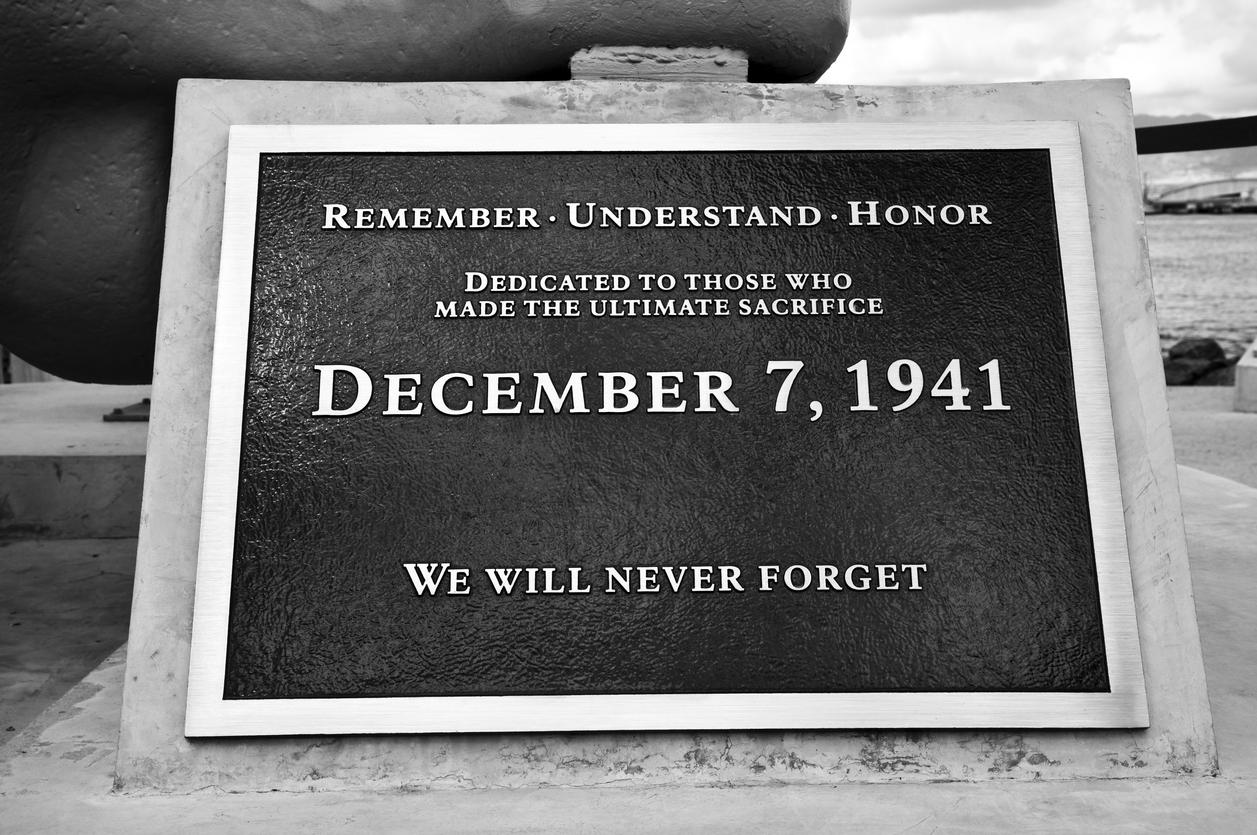Eighty-two years ago, in the sneak attack on Pearl Harbor, Japanese forces surprised and killed 2,403 Americans and wounded more than 1,100. In a speech to the U.S. Congress the next day, President Franklin Roosevelt referred to December 7, 1941, as "a date which will live in infamy." That prediction remains true on this observance of Pearl Harbor Day, 2023.
In December 1941, the people of Alabama, and indeed of most of the then-48 states, did not know where Pearl Harbor was. They learned very quickly and have never forgotten.
The 1941 Congress quickly passed a formal declaration of war, and America entered World War II. The attack on Pearl Harbor swept away the feeling of security of many Americans that we were immune from attack due to our separation from the old world by the Atlantic and Pacific oceans. Suddenly, Pearl Harbor, Hawaii, did not seem so distant from Alabama.
The Pearl Harbor attack ignited Alabama's determination to disable the Japanese war machine. Alabama people were filled with patriotism, and individuals sought to aid in victory. Many immediately enlisted in the military and fought for their country.
My own father, Bloise Zeigler, was already working in a defense-support job at Huntsville Arsenal, now Redstone Arsenal. Two days after Pearl Harbor, Dad went down and enlisted. The next day, management pulled him into the Huntsville office and told him they had canceled his enlistment because he was needed in the defense effort right where he was, in a strategic defense job. He served his country right here in Alabama.
For most who stayed in Alabama, their role in the war effort consisted of rationing their use of items such as gasoline, sugar, butter, and canned goods. Many Alabamians purchased war bonds and supported the families of those overseas. Most prayed. A war was to be won, and Alabamians, always patriotic, were willing to do their part to win it.
Pearl Harbor can be cited as a shining example of American exceptionalism and Christian benevolence. After being attacked in so cowardly a fashion, after the Japanese declared war on the United States, and after winning a long and bloody war against Japan, the United States saved and rebuilt Japan. The people of Japan have had no better friend and helpmate than the former object of their attack, the United States.
America, in its mentoring of defeated Japan, stands as a living example of the instruction of Jesus to love your enemies and do good to them.
Luke 6:27-28: 27 .... I say: Love your enemies, do good to those who hate you, 28 bless those who curse you, pray for those who mistreat you.
Those America-bashers who speak of a selfish, racist America need only look at how America treated the Japanese people following the Pearl Harbor attack, the bloody war, the Bataan Death March, the Japanese prison camps, the kamikaze suicide attacks and the long-delayed refusal to surrender.
What historical example would be comparable to America's rebuilding of Japan?
Note with great benefit that the United States first fought the war in the Pacific and then made the decision to twice use the atomic bomb on Japan to bring the war to an end and save hundreds of thousands of lives. Then, the evil leadership of the Japanese empire was firmly removed. Only when it was prudent to do so did the United States switch from swords to plowshares.
One thousand seven hundred and seventy-seven Americans died at Pearl Harbor aboard the USS Arizona. They included 32 Alabama service members:
Robert Franklin Adams – Waterloo.
James Thomas Benson - New Castle.
Charles Henry Bibby – Littleton.
Millard Charles Bishop – Albertville.
James Theron Black – Thompson.
Theron A. Blankenship – Hartselle.
Charles Andrew Boyd – Dothan.
Johnnie Cecil Broadhead – Billingsley.
Donald Ross Chandler – Millport. His brother Edwin survived the attack.
Robert Niven Frizzell - Birthplace in Alabama unknown.
Frank Weaver Hindman – Piedmont.
Claude Herbert Holland, Jr. – McGraws.
Lowell D. Holmes – Rockcastle.
Lewis Burton Hughes, Jr. – Tuscaloosa.
Luther James Isom - Madison County.
Dr. Samuel Earle Johnson – Clanton. Johnson was a graduate of Vanderbilt School of Medicine. On the day of the attack, he was in charge of medical services on board the Arizona. His body was never recovered.
Daniel Pugh Jones and Woodrow Wilson Jones – Cottondale brothers.
William Moore McCary – Birmingham. McCary was a tuba player with the U.S. Navy Band. The band reported to the Arizona in June 1941, and all members died during the attack as they manned battle stations, passing ammunition under gun turret number one. McCary's body was never recovered.
S.W.G. McGrady – Troy.
Owen Newton Morris – Bessemer.
Alfred Rose and Louis Duffie Nichols - Brothers from Fayette.
Howard Lee Penton – Pentonville.
Avis Boyd Putnam – Childersburg.
Thomas Sprugeon Rogers – Birmingham.
Irland Shores, Jr. - Marshall County.
Charles Braxton South – Alabama.
Comer A. Wilson – Andalusia.
As we remember those who lost their lives in the Pearl Harbor attack, let us be mindful of the blessings of living in America. After World War II, America worked and became a world superpower.
Today, America is blessed with abundant wealth and resources, as well as global influence. Most of all, America is blessed with citizens who face adversity with resilience and determination.
Jim Zeigler is a former Alabama Public Service Commissioner and State Auditor. You can reach him for comments at ZeiglerElderCare@yahoo.com.
Don't miss out! Subscribe to our newsletter and get our top stories every weekday morning.










